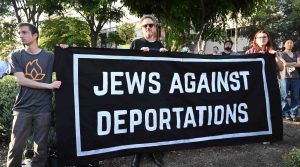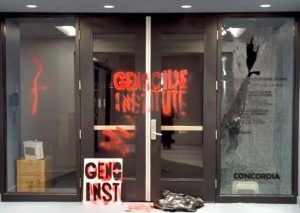Representatives for the pro-Palestinian encampment at the University of Toronto were still deciding on Friday how to respond to an offer from the school to either end the demonstration or be issued a notice of trespass. The offer was given in the afternoon of May 23, and gave the encampment 24 hours, until 4 p.m. on Friday, to vacate before they would be issued the notice.
The subsequent trespassing notice indicated an 8 a.m. Monday deadline for protesters to either leave the encampment site or face the consequences of UofT taking “all necessary legal steps including seeking an Order from the Ontario Superior Court of Justice.”
The university’s offer includes a review of the divestment process. However, it will not cancel any partnerships with Israeli universities, one of the demands of the protesters.
“The University rejects calls for cutting ties with international partner institutions or engaging in academic boycotts because these actions would be at odds with our commitment to academic freedom, the unfettered global circulation of people and ideas, and advancing understanding by fostering collaboration and dialogue,” read the statement from UofT president Meric Gertler.
The offer is conditional on the encampment clearing and not resuming at any campus of the university. Participants must not disrupt upcoming convocation ceremonies, scheduled to commence June 3.
The encampment was set up at UofT on May 2 on a grassy quad. It is part of a wave of pro-Palestinian protests on Canadian and U.S. universities, in response to Hamas’ Oct. 7 attack on Israel and the ensuing Israel-Hamas war in Gaza.
The university’s offer includes a review of the divestment process, and the establishment of an advisory committee to review the student protesters’ demands.
The committee would be composed of faculty, staff, students, and alumni with relevant expertise. Student representatives of the encampment would be able to suggest qualified individuals for membership. The process would end with Gertler considering the committee’s report and making “a decision on next steps in a timely manner.”
The offer also included the creation of an expert working group to “consider options for disclosure and increased transparency related to the University’s investments.” The timeline for this aspect of the offer is more concrete, with best efforts by the working group to deliver its recommendations by mid-July, and a response from Gertler within three weeks.
Representatives of the encampment, who held a press conference the morning of May 24, say the offer is not close to meeting their demands.
“This is their so-called final offer. It’s actually their very first printed offer that they’ve given us. And it is what they’ve deemed, quote-unquote, the very best that they can give us. This document is a farce. This document is nothing but a summary of their already existing procedure on divestment and disclosure, with a few minor tweaks to bait us into thinking that we are getting a good deal out of this,” said Kalliopé Anvar McCall, one of the representatives of the encampment who spoke at the press conference.
Anvar McCall, a fourth-year student majoring in Diaspora Studies, also accused the school of not negotiating in good faith. According to Anvar McCall, the school expected an offer from the encampment team at the same meeting they first proposed it, leading her to call the process a “joke of a negotiation.”
“To make matters worse, 30 minutes prior to our meeting yesterday, we were informed that President Gertler is hosting a press conference in the middle of our negotiations with the administration in a completely different building on campus. Why are we meeting with the administration when there is already a pre-determined outcome on their end?” Anvar McCall said.
“By addressing the press in the middle of our meeting and by giving a live radio interview this morning, it is clear that the administration has no intention to negotiate or engage in dialogue with us in good faith. They have already made up their minds and they are ready to tell the world. This is not an offer, this is an ultimatum. They are trying to force us to accept these outrageous terms by threatening to clear us out at the same time.”
Erin Mackey, a fourth-year student in political science and environmental science and a representative of the encampment, pointed out that the protesters saw the offer as the beginning of negotiations because Gertler finally came to the table, citing his radio interview with CBC.
“During that interview he stated that there is room for further negotiations. And ultimately, we view this as the first offer. In their notice to all UofT students and to all of you, I’m sure they framed it as the final offer. But really, there is much more room for the university to go,” she said.
“We have been given a proposal for a committee. We have not been given commitments for divestment. We want commitments for divestment. We demand commitments for divestment. And we demand the University of Toronto divest from Israeli apartheid.”

In an Instagram post around 4 p.m. Friday, organizers reiterated that the university was negotiating in bad faith, and said it was making “thinly veiled threats of police violence” over the potential refusals to vacate following the trespass notice. They referenced the language in UofT’s May 23 offer, and Gertler’s CBC Radio interview, calling into question previous assurances by administration that they did not wish to and would not call in Toronto Police Services (TPS).
The Occupy UofT for Palestine post did not specify further what organizers might do about the Monday deadline, and called for supporters to “increase pressure” on the university, via phone calls and emails supporting protesters’ demands of disclosure, divestment and cutting a number of Israeli academic ties.
Earlier on Thursday, before the university’s offer, three UofT students who had signed an open letter to Gertler held a news conference outside Simcoe Hall before delivering the letter, which had appeared in local weekend newspapers.
The letter said the encampment was violating use of space policies, posed safety and security risks and disrupted the academic environment. It cited the university’s own acknowledgement, on May 8, of instances of hateful messaging and blocking of parts of the commons. Student and faculty signatories, including many Jewish members of the university community, urged Gertler to “take swift action” to end the encampment in accordance with university policies and the law.
Matan Frankl, one of several Jewish students who spoke Thursday before delivering the letter, said recent events had made the community feel unsafe and unwelcome on the campus.
“Students have been blocking other students from entering buildings, they have been blocking access to university campus grounds, and that’s a problem,” Frankl told reporters.
“There’s this… feeling that there’s no dialogue to be had,” he said.
“Universities are for facilitating conversations, for facilitating the peaceful productive spread of ideas and thoughts. That is not what the situation has resulted in.”
Jay Solomon, chief advancement officer for Hillel Ontario, said it’s time for the universities to start acting against “these unlawful occupations.”
“This is a university that is seemingly negotiating with organizers of an unlawful occupation. These are people who have for weeks been displaying pro-Hamas, pro-terror imagery. These are people who have been occupying university space illegally. These are people who have been chanting that Zionists should be removed from campus. Of course, we all know that Zionist is another word for Jew. It’s shameful that the university has allowed it to get to this point, and it’s about time that they take some action to restore order,” he said.
Solomon also pointed out the effect that the encampment has on members of the UofT community beyond just the Jewish population on campus.
“These anti-Israel activists are threatening to disrupt commencement and graduation. This is the same cohort that four years ago, when they graduated high school, had their graduation cancelled as a result of the COVID-19 pandemic. And now you have these unlawful occupations that are threatening to yet again cancel this cohort’s graduation. That’s deeply concerning. And Jewish students, non-Jewish students should have the opportunity to go to school and graduate school without having to face this hateful occupation.”
Some Jewish members of the UofT community disagree with the characterization of the encampment as antisemitic. The Jewish Faculty Network (JFN) is a group of Canadian Jewish professors who have supported the encampments.
Deb Cowen, a member of the steering committee for JFN and geography professor at UofT, said the antisemitism occurring at the encampments is coming from protesters outside and is directed at Jewish members inside the encampment.
Cowen blames anti-Palestinian racism as the only reason why the school refuses to invoke a policy to investigate the implications for partnerships with the state of Israel.
“There is no question that there have been war crimes and there is no question that there’s been human rights violations,” she said. “So if in this context where there has been massive human rights violations… (if) the policy is not relevant in a context of extreme, systemic, sustained, mass human rights violations, when is this policy relevant?”
“If it’s not relevant in this context, the only reason can be anti-Palestinian racism.”
Authors


Jonathan Rothman is a reporter for The CJN based in Toronto, covering municipal politics, the arts, and police, security and court stories impacting the Jewish community locally and around Canada. He has worked in online newsrooms at the CBC and Yahoo Canada, and on creative digital teams at the CBC, and The Walrus, where he produced a seven-hour live webcast event. Jonathan has written for Spacing, NOW Toronto (the former weekly), Exclaim!, and The Globe and Mail, and has reported on arts & culture and produced audio stories for CBC Radio.
View all posts








